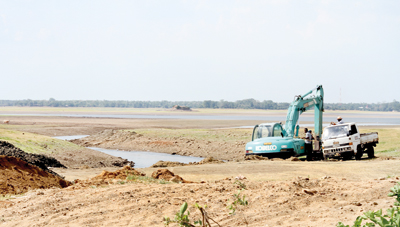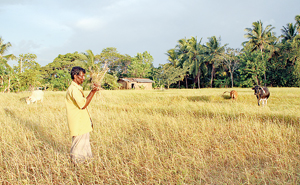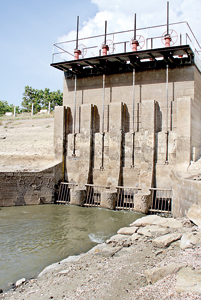News
Parched land: The cracks widen
Authorities say water was released at the request of some farmers, govt. working out relief package for affected farmers
The rice bowl of the country is starving. The Polonnaruwa district, which produces one tenth of the country’s rice production, has been hit by a devastating drought.
![]()
Cattle graze on the few remaining green plants in the fields abandoned by farmers. In some paddy fields farmers are busy trying to salvage part of the crop by irrigating the fields with water pumps. In Elahera, in the Polonnaruwa district the farmers who had fore-warning did not cultivate for fear of an impending water shortage.

Backhoes at work: Digging up trenches so that the water below the sluice gates of the Parakrama Samudraya can be used.
The Parakrama Samudraya in the historic Polonnaruwa district which irrigates nearly 8,000 hectares (over 19,000 acres) resembles a desert, with the tank bed drying up. There are puddles of water here and there.Officials were forced to dig a trench to drain out the remaining water. This was to salvage paddy crops that were affected. But, farmers say it’s too little too late.
The tank bed is being dug up by backhoes and the soil transported elsewhere, with highway contractors seizing the opportunity to utilise backhoes. Lorry loads of soil are being transported for road construction projects. Officials say they are removing the silt, but farmers in the area say that unskilled workers were doing the job without supervision and this could damage the tank bed.
The water management has been completely mismanaged, says Kaudulle Piyatissa, a farmer organisation leader from Hingurakgoda.
“We don’t accept the claims that Polonnaruwa district has been hit by the drought. It was only in March that we had heavy rains which were sufficient for the water in the Parakrama Samurdaya to reach spill level,” he said. “Our issue is why the water was released in advance before the cultivation period started,” he said.
Several farmers we spoke to expressed this same concern.“If it was a drought situation the water levels in the bed of the tank too will drop and simultaneously the water level in the wells will drop. But in this case the water levels in the wells have not dropped,” observed another farmer S.Ratnayaka from Agbopura.
Farmers claim that the authorities wanted to release the water in mid-March, but farmers were not ready to start the next season, popularly known as the Yala. “Though we were not prepared, authorities decided to release water from early April. As a result the water flowed-over and the farmers were unable to make use of it,” farmer K.N.Wickremesinghe from Agbopura charged.
He said that as a result when the farming lands required the water they ran short of it resulting in crop damage.
“The irony is that after a series of farmer protests and the fact that the elections are nearing, authorities are now releasing water to the fields, but it’s too late,” farmer Ratnayaka pointing to his field said.

Cattle grazing in abandoned paddy fields
“If they claim that it is due to the drought that we did not have water, our question is from where is the water coming now. This is why we say it is a case of mismanagement,” he added.We witnessed the water flowing through some of the dry or partially dry fields in Kuranagama, Jayanthipura, about 20 kilometres off Polonnaruwa. This was one of the many fields being irrigated after the crops had been destroyed.
However, Polonnaurwa’s Government Agent Nimal Abeysiri dismisses the farmers’ charges and blames them for the situation. Mr. Abeysiri says since the Parakrama Samudraya had reached spill level by the March- April period the farmers were offered water.
“They were not willing to make use of the water at the time it was offered. They wanted to take the water after celebrating the new year. However, a few of the farmers wanted the water and therefore we were compelled to release the water,” he said. “The water flowed-down without being used. It was a waste,” he said.
“During the latter stages we did not have sufficient water to release. But this was not due to any fault of ours,” the GA claimed.
However, he said the government is now working out a plan to provide relief for affected farmers in the district adding that they were in the process of estimating the damage to crop, to pay compensation.
“We are also paying an allowance of Rs. 5,000 to each farmer to clear the irrigation canals close to their farming lands. We are also offering to buy a kilo of paddy between Rs. 28 to 30. In addition we are looking to resolve the problems related to the farmer pension scheme,” he said.

Parakrama Samudraya: The water level is below the lower level of the sluice gates
Mr. Abeysiri said in view of the situation the President had directed to take measures to remove silt from the tanks to ensure that they can accommodate a bigger volume of water. “We have started the process,” he added.
Despite claims by authorities that the farmers were being offered a guaranteed price for paddy from Rs. 28 to 30, a cross section of the farmers said the government had imposed high standards and many of the farmers could not produce paddy of that quality.
“We are eventually forced to sell the paddy at about Rs 22 a kilogram to the private sector. The cost of production is much higher,” he said.
Farmer organistions have already launched a series of protests demanding that compensation be paid to them.
In addition to compensation they are also demanding that banks delay recovery of loans taken for cultivation, stop the recovery of interest for the loans, and prevent banks auctioning gold jewellery they have pawned .
However, some of the farmers believe that they may not be entitled to compensation if they have borrowed money privately. “If you have taken a loan from a bank there is documentary evidence but if it is a private loan we cannot prove that we have taken it,” farmer K. Dharmalilaka from Giritale said.
As farmers in Polonnaruwa struggle to recover from the crisis preparations are steaming ahead for the upcoming provincial elections.
Drought won’t cause food shortage, says top official
By Harish Murali
The drought affecting several parts of the country has destroyed more than 100,000 acres of paddy land, but the good news is that a rice scarcity is unlikely because there are enough stocks in reserve, according to a top official.
Agrarian Development Department Commissioner General Sunil Weerasinghe said more than 100,000 acres of paddy cultivation have been affected in the Anuradhapura, Polonnaruwa, Kurunegala and Puttalam districts.
He said the government was assessing the damage also in partially-affected areas with the intention of paying compensation to farmers.
Mr. Weerasinghe said measures were being taken to de-silt rivers which irrigated the land in the drought-hit areas where farmers growing paddy, corn and vegetables had been hit by the crop failure.
However, the Commissioner General assured that there were enough stocks in the reserves to feed the country’s population although there was a 30 per cent decline in paddy production. The Ministry of Agriculture was assessing the extent of the crop damage in the affected districts and had submitted a proposal for the government to work out a compensation package to paddy farmers and a partial package for those who cultivate other crops, he said.
The Treasury has already released Rs 3.7 billion to pay compensation to farmers and is expected to release more funds, the Sunday Times learns.Wildlife and Agrarian Services Minister S.M. Chandrasena said the compensation package included a monthly allowance of Rs 6,000 per farmer family and free supply of chemical fertilizers and seed.
A major portion of the money for the drought relief was being used for de-silting of the rivers that irrigated the agricultural land, he said. The drought situation has also hit the country’s economic growth with a big drop in the GDP contribution by the agriculture sector.
Also badly hit by the prevalent drought is the country’s power sector. Hydropower generation has been drastically reduced, leading to a situation where the government has to incur an additional Rs. 200 million expense by increasing the thermal power generation.
W.L. Sumathipala, Director of the Climate Change Division at the Environment Ministry said that during the south west monsoon these droughts affected regions in the North Central Province did not get enough rainfall to cultivate crops such as paddy and therefore farmers should switch to crops which require less water.
He said the farmers in the NCP had been advised to grow vegetables and certain fruits but they hardly heeded the advice, he added.
comments powered by Disqus
























